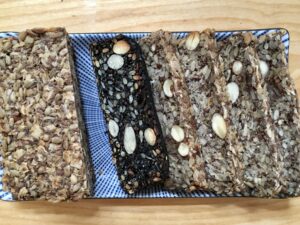Why is gluten causing so many problems?
Gluten is a protein complex that makes up to 85 percent of the protein found in bread wheat (and barley and rye). This complex is also what helps foods maintain their shape, essentially “gluing” the food together. Normally associated with bread and pasta, gluten can be found in a variety of foods that you may not expect.
There are several different ways gluten can affect an individual: gluten intolerance, gluten sensitivity and celiac disease. The main differences between a food allergy and sensitivity is your physical response to the food item or group. If an allergy is causing the issue, your immune system is fighting the allergy as if it is a poison, a toxin. If it is an intolerance or a sensitivity, the reaction will come of your digestive system.
 Celiac disease is said to be an autoimmune disease that throws your immune system into full-scale war on your digestive tract once it senses gluten. These attacks can lead to serious damage to the villi (small, finger-like receptors in the small intestine). Once damaged, villi can no longer absorb nutrients.
Celiac disease is said to be an autoimmune disease that throws your immune system into full-scale war on your digestive tract once it senses gluten. These attacks can lead to serious damage to the villi (small, finger-like receptors in the small intestine). Once damaged, villi can no longer absorb nutrients.
Some signs or symptoms of gluten intolerance include:
Abdominal pain: after ingesting food, this is the single most common indicator of a gluten issue.
Bloating: Research suggests up to 87 percent of people with gluten sensitivity experience severe bloating. A very uncomfortable symptom, bloating can make your stomach feel full of gas or even swollen. While this symptom alone accounts for several different digestive issues, in combination with the ones below, it is a strong indicator of gluten-related issues.
Diarrhoea, constipation, and uncomfortable bowel movements: Another fairly common digestive issue on its own, diarrhoea and/or constipation can be a sign of celiac disease when paired with other symptoms. In celiac patients, it is caused by the inflammation in the gut after an individual consumes gluten. This consumption damages the gut lining and can cause extreme digestive disruption. Frequent cases of diarrhea are not only uncomfortable, they can lead to other health problems, including dehydration and fatigue.
Skin issues: Gluten can cause a variety of issues internally, but it can also show up externally. Dermatitis herpetiformis is a skin disorder caused specifically by celiac disease. Psoriasis can also be affected by gluten. Research has shown success in treating skin issues by eliminating gluten from a patient’s diet.
Anxiety, depression, and tiredness: Tiredness after a heavy meal is not necessarily a health concern. However, prolonged bouts of tiredness following meals containing gluten is. Especially with celiac disease, individuals who suffer from digestive issues tend to be more prone to depression and anxiety than those who do not.
If you have been diagnosed with gluten intolerance, coeliac disease or choose to be gluten-free what is the next step? It is not as complicated as it looks. There are a lot of options and delicious recipes.
Many people report just feeling healthier day-to-day eating gluten free.
Switching to gluten free is not difficult but you need to to choose healthy options.as many gluten-free products are loaded with sugar and/or packed with preservatives and additives.
Like with all food, make the biggest part of your diet organic and plant based and for other items like GF pastas. crackers etc..
1/Check the ingredients
Choose products made predominantly from nuts, vegetables and seeds. If you can’t understand ingredients with long, complex chemical names, try and find a healthier option.
2/Choose natural simple sugars
Fruit (whether fresh, dried or frozen), honey, maple syrup and yacon syrup are good options
3/Eat naturally gluten-free wholegrains
Brown rice, Quinoa, Buckwheat, Amaranth, Wild rice, gluten free oats
Recognised Benefits of eating Gluten Free
Better Digestive Health, Increased Energy Levels, Reduced Inflammation, Better Mood, Improved Cholesterol Levels, Reduced Risk of Heart Disease and Diabetes, Promotes Healthy Weight-loss
Recipes: Seed Bread
Sources & Read more: https://nogluten.com/benefits-of-eating-gluten-free & Lucy Eva Nutritionist (Flannery)
